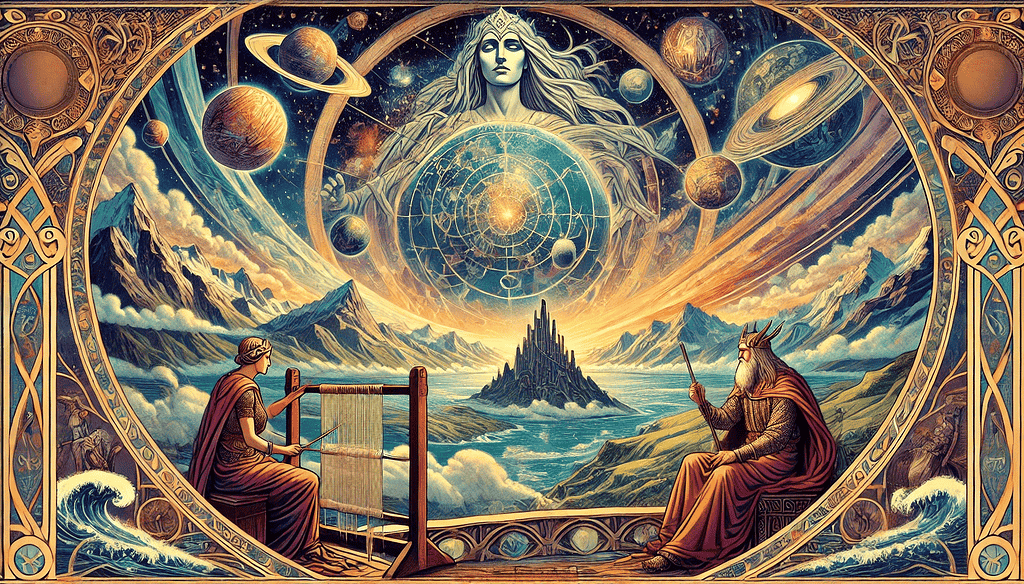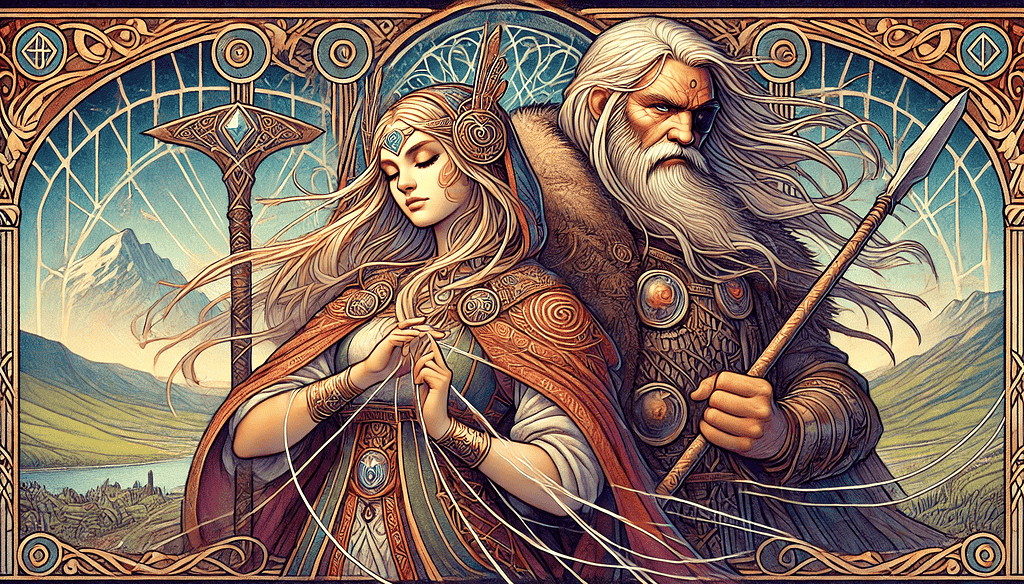No products in the cart.
July 7, 2024 7:14 am
July 7, 2024 7:14 am
Frigg and Odin are central figures in Norse mythology, representing divine power and wisdom. Frigg is the Goddess of Motherhood and Marriage, while Odin is the Allfather, renowned for his insatiable thirst for knowledge and unparalleled wisdom.
Their relationship is significant and complex, involving instances of infidelity and strategic alliances. This partnership influences various aspects of Norse mythology, particularly through their offspring, such as Balder.

Frigg is known as the Goddess of Motherhood and Marriage in the Norse pantheon. She is wise and has the ability to see into the future. Frigg is often shown weaving the threads of fate, representing her control over destiny.
She is married to Odin and embodies the qualities of a nurturing mother. Her influence extends to marriage, family, and home, making her an important figure for humans who seek her blessings for fertility and harmony in their families.
Odin holds the title of Allfather, which signifies his supreme position among the Norse gods. He is also known as the God of Wisdom. Odin is famous for his relentless pursuit of knowledge, even if it requires great sacrifices
In one well-known myth, he gave up one of his eyes at Mimir’s well to gain deep wisdom. His unquenchable thirst for understanding also led him to hang himself on Yggdrasil, the world tree, for nine days and nights in order to discover the secrets of runes.
The relationship between Frigg and Odin shows an interesting interplay between their different personalities. Frigg’s nurturing nature complements Odin’s strict, sometimes merciless quest for wisdom.
While Frigg often provides emotional support and stability, Odin’s strategic mind ensures they face challenges with unmatched intelligence.
Their relationship is not just based on love but also on a strong partnership where each god’s strengths support the other. This harmony is evident in their roles as divine rulers and parents, demonstrating a balanced combination of kindness and authority.
Understanding these aspects of Frigg and Odin helps us see how their individual characteristics shape their legendary partnership—a grand tale deeply rooted in Norse mythology.

The union between Frigg and Odin represents divine marriage, symbolizing both harmony in the heavens and the challenges faced in any relationship. As a married couple, they play a central role in Norse mythology, showcasing the complexities of love, power, and responsibility.
Frigg, the wise goddess of motherhood and fertility, possesses knowledge that complements Odin’s relentless pursuit of wisdom. However, their partnership is not without its difficulties:
Despite these challenges, their union also demonstrates significant strengths:
As parents, Frigg and Odin extend their impact further into Norse mythology through their son Balder:
The tragic story of Balder’s death powerfully illustrates their roles as divine parents. When Balder is ultimately slain by a mistletoe arrow, thrown unintentionally by his blind brother Höðr due to Loki’s trickery, both Frigg and Odin are consumed by profound sorrow.
Despite their immense power, they experience loss just like mortal parents would.
This divine partnership serves as an example of how love can withstand trials and emphasizes the delicate balance between strength and vulnerability that characterizes truly remarkable relationships.

Myths about Frigg and myths about Odin often intertwine, revealing the profound bond they share. One of the most poignant stories is the myth of Balder’s death, which underscores themes of love, sacrifice, and destiny.
Balder, the beloved son of Frigg and Odin, was prophesied to die, casting a shadow over Asgard. Consumed with motherly love and fear for her son’s safety, Frigg sought to prevent this tragic fate.
She traveled across the realms extracting promises from all living things not to harm Balder. Every creature vowed except for one: mistletoe.
Frigg overlooked this seemingly harmless plant, a fateful mistake. Loki, ever the trickster, exploited this vulnerability. He fashioned a dart from mistletoe and guided the blind god Hodr to throw it at Balder during a playful game. The dart struck true, and Balder fell dead.
Frigg’s desperate attempts to save Balder highlight her deep maternal love and the lengths she would go to protect her family. Her actions emphasize:
Odin’s role in these myths also reveals his complexity as a father and ruler. His grief over Balder’s death shows his vulnerability despite his immense power.
Another significant myth involves Frigg’s foresight and Odin’s quest for knowledge:
These stories not only define their characters but also enrich our understanding of Norse mythology’s intricate tapestry. They exemplify how divine love can inspire epic tales that transcend time.
The myths about Frigg and Odin show that their relationship is more than just marital; it’s a union that shapes destinies and weaves through the very fabric of existence itself.

The relationship between Frigg and Freyja in Norse mythology is fascinating. Both goddesses are incredibly important, with roles in love, fertility, and destiny. However, there is still much debate about how they are connected.
There are several theories that suggest Frigg and Freyja may have come from the same place or have a shared family background. Some experts believe that in the earliest Germanic myths, they were actually one goddess who later became two separate figures in Norse mythology. This theory is supported by:
Even though there are these similarities between them, Frigg and Freyja are still very different from each other in Norse mythology:
“Frigg knows everything that is going to happen, but she doesn’t tell anyone,” as mentioned in the Prose Edda, emphasizing her silent wisdom.
When Freyja cries, her tears turn into gold, representing both sadness and wealth.
Some interpretations suggest that Frigg and Freyja are two sides of the same coin—an archetype that represents both loyalty in marriage and unrestrained passion. This idea reflects ancient beliefs about women and the concept of femininity in a divine context.
By exploring the relationship between these goddesses, we gain insight into larger themes about how myths change and adapt throughout different cultures and time periods. The intricate connection between Frigg and Freyja enhances our knowledge of Norse mythology as a whole.

Frigg and Odin are not just gods; they play a significant role in shaping the Norse universe. Frigg, known as the weaver of destiny, holds immense power in deciding the fates of both gods and humans. Her skillful weaving represents her crucial role in maintaining harmony in the cosmos.
Picture Frigg sitting at her loom, skillfully intertwining threads of fate, making sure that everything happens according to plan.
On the other hand, Odin rules over the realms with his unmatched wisdom and authority. His relentless pursuit of knowledge, even at great personal cost, solidifies his position as the father of all gods. But his kingship is not about control alone; it’s about using his wisdom to guide the universe towards a better future.
Imagine Odin, sitting on his throne Hlidskjalf in Asgard, observing everything with his one remaining eye, seeing beyond what others can perceive.
Frigg’s influence can be felt across the Nine Worlds:
Odin’s influence extends throughout the cosmos as well:
Odin’s role in the afterlife is more direct. He chooses fallen warriors for Valhalla, training them for Ragnarok, the ultimate battle at the end of times. This dual role demonstrates how both deities contribute to maintaining balance in the universe:
Their combined efforts ensure a balanced cosmos where destiny is honored, knowledge prevails, and souls find their way on their eternal journeys.

The love story of Frigg and Odin offers timeless wisdom that can enrich modern relationships and self-perception. Examining their divine union, you discover principles that transcend the mythological realm into practical life lessons.
Drawing inspiration from these divine figures can lead to more fulfilling relationships and a stronger sense of self-worth. Their love story teaches you that enduring partnerships are built on mutual respect, support, and balance, while individual growth stems from embracing one’s strengths and making mindful sacrifices.

The love story of Frigg and Odin has a profound influence on Norse mythology. Their union is characterized by wisdom, sacrifice, and deep affection, and it still holds significance to this day.
Incorporate their wisdom and magic into your own spiritual journey. Find inspiration from their divine union, using it as a guide for healthy relationships and self-acceptance.
May the eternal bond of Frigg and Odin inspire you to find balance, strength, and enduring love in your life.